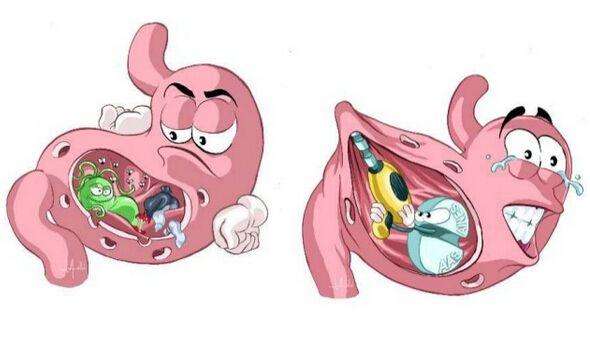Probiotics on H. Pylori


Helicobacter pylori (H. pylori) is a type of bacteria. These germs can enter our body and live in our digestive tract. After many years, they can cause sores, called ulcers, in the lining of your stomach or the upper part of your small intestine. For some people, an infection can lead to stomach cancer.
Infection with H. pylori is common. About two-thirds of the world’s population has it in their bodies. For most people, it doesn’t cause ulcers or any other symptoms. If you do have problems, there are medicines that can kill the germs and help sores heal.
For decades, doctors thought people got ulcers from stress, spicy foods, smoking, or other lifestyle habits. But when scientists discovered H. pylori in 1982, they found that the germs were the cause of most stomach ulcers.
After H. pylori enters your body, it attacks the lining of your stomach, which usually protects you from the acid your body uses to digest food. Once the bacteria have done enough damage, acid can get through the lining, which leads to ulcers. These may bleed, cause infections, or keep food from moving through your digestive tract.
You can get H. pylori from food, water, or utensils. It’s more common in countries or communities that lack clean water or good sewage systems. You can also pick up the bacteria through contact with the saliva or other body fluids of infected people.
Many people get H. pylori during childhood, but adults can get it, too. The germs live in the body for years before symptoms start, but most people who have it will never get ulcers. Doctors aren’t sure why only some people get ulcers after an infection.
If you have an ulcer, you may feel a dull or burning pain in your belly. It may come and go, but you’ll probably feel it most when your stomach is empty, such as between meals or in the middle of the night. It can last for a few minutes or for hours. You may feel better after you eat, drink milk, or take an antacid.
Other signs of an ulcer include:
- Bloating
- Burping
- Not feeling hungry
- Nausea
- Vomiting
- Weight loss for no clear reason
Ulcers can bleed into your stomach or intestines, which can be dangerous to your health. Get medical help right away if you have any of these symptoms:
- Stool that is bloody, dark red, or black
- Trouble breathing
- Dizziness or fainting
- Feeling very tired for no reason
- Pale skin color
- Vomit that has blood or looks like coffee grounds
- Severe, sharp stomach pain
It’s not common, but H. pylori infection can cause stomach cancer. The disease has few symptoms at first, such as heartburn. Over time, you may notice:
- Belly pain or swelling
- Nausea
- Not feeling hungry
- Feeling full after you eat just a small amount
- Vomiting
- Weight loss for no reason
If you don’t have symptoms of an ulcer, your doctor probably won’t test you for H. pylori. But if you have them now or have in the past, it’s best to get tested.
To start, your doctor will ask you about your medical history, your symptoms, and any medicines you take. Then she’ll give you a physical exam, including pressing on your belly to check for swelling, tenderness, or pain. You may also have:
Tests of your blood and stool, which can help find an infection
Urea breath test. You’ll drink a special liquid that has a substance called urea. Then you’ll breathe into a bag, which your doctor will send to a lab for testing. If you have H. pylori, the bacteria will change the urea in your body into carbon dioxide, and lab tests will show that your breath has higher than normal levels of the gas.
If you have ulcers caused by H. pylori, you’ll need treatment to kill the germs, heal your stomach lining, and keep the sores from coming back. It usually takes 1 to 2 weeks of treatment to get better.
Studies have shown Nutra Season’s Ultra Probiotics helps the conditions of H. Pylori, check the link below. By taking Ultra Probiotics which contains bacillus coagulans MTCC5566 6 billion and amla fruit extract of 500mg, it will keep the H. Pylori virus at bay.
United States Patent: 10792295 (uspto.gov)
Content credit to: American Cancer Society
